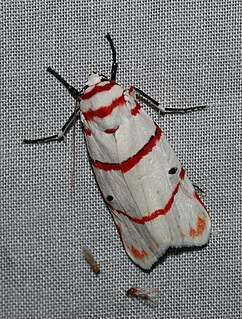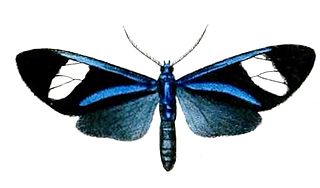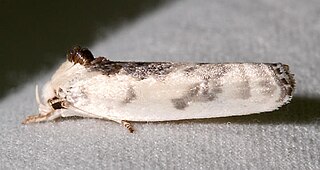Related Research Articles

Spilomelinae is a very species-rich subfamily of the lepidopteran family Crambidae, the crambid snout moths. With 4,132 described species in 340 genera worldwide, it is the most speciose group among pyraloids.

Hypena is a genus of moths in the family Erebidae. It was first described by Franz von Paula Schrank in 1802. These non-migratory moths overwinter as pupae and almost never come to bait as adults.

Omiodes is a moth genus in the family Crambidae. Several species are endemic to Hawaii.

Cisthene is a genus of lichen moths in the family Erebidae. The genus was erected by Francis Walker in 1854.

Cosmosoma is a genus of tiger moths in the subfamily Arctiinae. The genus was erected by Jacob Hübner in 1823.

Cyana is a genus of moths in the family Erebidae. Species are well distributed in Africa, Madagascar, China, India, Sri Lanka, Myanmar, Sumatra, Java and Borneo. The genus was erected by Francis Walker in 1854.

Euagra is a genus of moths in the subfamily Arctiinae. The genus was erected by Francis Walker in 1854.

Virbia is a genus of tiger moths in the family Erebidae. The genus was erected by Francis Walker in 1854.

Phostria is a genus of moths of the family Crambidae.

Antaeotricha is a genus of moths. It is the largest genus in the subfamily Stenomatinae, numbering over 400 species in the Western Hemisphere.
Euagra angelica is a moth of the subfamily Arctiinae. It was described by Arthur Gardiner Butler in 1876. It is found in Colombia.
Euagra caerulea is a moth of the subfamily Arctiinae. It was described by Paul Dognin in 1891. It is found in Ecuador.
Euagra chica is a moth of the subfamily Arctiinae. It was described by George Hampson in 1898. It is found in Bolivia.
Euagra coelestina is a moth of the subfamily Arctiinae. It was described by Caspar Stoll in 1781. It is found in Suriname and the Brazilian state of Pará.
Euagra fenestra is a moth of the subfamily Arctiinae. It was described by Francis Walker in 1854. It is found in Brazil.
Euagra haemanthus is a moth of the subfamily Arctiinae. It was described by Francis Walker in 1854. It is found in Mexico, Guatemala and Panama.
Euagra intercisa is a moth of the subfamily Arctiinae. It was described by Arthur Gardiner Butler in 1876. It is found in Venezuela.

Euagra latera is a moth of the subfamily Arctiinae. It was described by Herbert Druce in 1890. It is found in Ecuador and São Paulo, Brazil.
Euagra seraphica is a moth of the subfamily Arctiinae. It was described by Max Wilhelm Karl Draudt in 1917. It is found in Colombia.
Euagra splendida is a moth of the subfamily Arctiinae. It was described by Arthur Gardiner Butler in 1876. It is found in Brazil.
References
- ↑ Savela, Markku. "Euagra azurea (Walker, 1854)". Lepidoptera and Some Other Life Forms. Retrieved February 5, 2018.
- Pitkin, Brian & Jenkins, Paul. "Search results Family: Arctiidae". Butterflies and Moths of the World. Natural History Museum, London.
| This Arctiinae-related article is a stub. You can help Wikipedia by expanding it. |